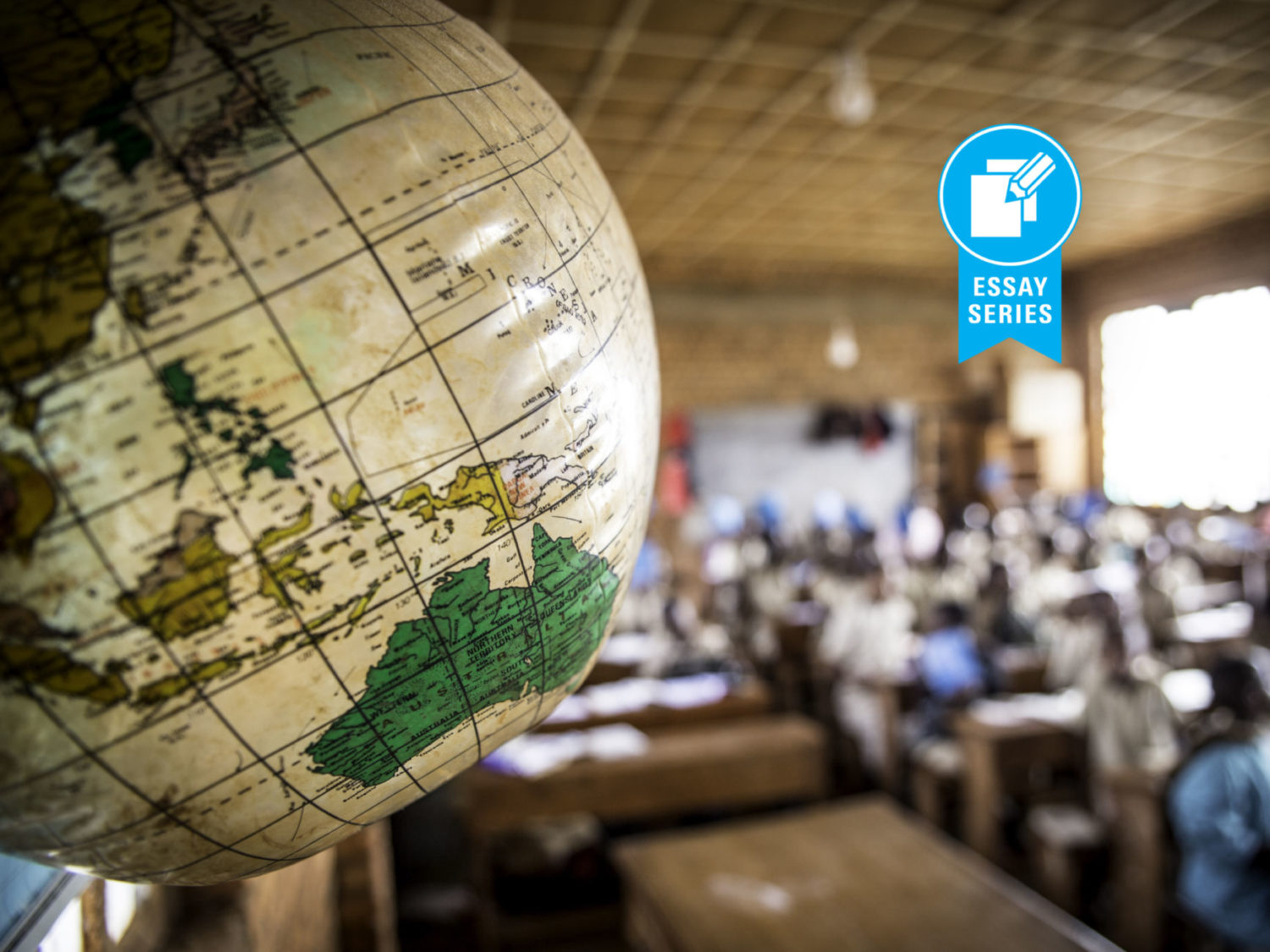
Building a fairer, safer world for children through science
Our Earth has existed for 45 million centuries. But this century is special: the first when the main threats are induced by one species, humans. We’re deep in the anthropocene. We have an ever-heavier collective footprint on the planet. We’re empowered by ever more powerful technologies that can be hugely beneficial, but which if misapplied could trigger catastrophic setbacks to civilization. And such events would be global: we’re so interconnected that no continent would be unscathed.
Yet, science, technology and innovation are also essential if we are to be able to solve the most pressing challenges facing humanity and our planet – climate change, global and intergenerational inequity, the availability of food, nutrition, healthcare and livelihoods for the world’s growing and ageing population.
Today’s children are very likely to live to see the end of the 21st century. What will their lives, and those of their own children be like? That depends on the decisions we take today – even just this year as the UK hosts the G7, a Global Education Summit and the COP26 climate conference. 2100 may seem a long way off, but the world needs to plan for it now, not leave it to the next generation to sort out the problems we created during the 20th century and have so far failed to solve in the 21st. Our leaders must think about the application of science very carefully and with the kind of long-term perspective that too often eludes politicians focused on the next election. Young people know this and are campaigning for a better future. Scientists should join them. And politicians would do well to listen.
Covid 19 should not have struck us so unawares. Why were even rich countries so unprepared? It’s because politicians and the public have a local focus. They downplay the long-term and the global. They ignore Nate Silver’s maxim: “The unfamiliar is not the same as the improbable’. Indeed, we’re in denial about a whole raft of newly emergent threats to our interconnected world, that could be devastating. Some, like climate change and environmental degradation, are caused by humanity’s ever-heavier collective footprint. We know them well, but fail to prioritise countermeasures, because their worst impact stretches beyond the time-horizon of political and investment decisions. It’s like the proverbial boiling frog – contented in a warming tank until it’s too late to save itself.
Another class of threat — global pandemics and massive cyber attacks, for instance — are immediately destructive and could happen at any time. The worst of them could be so devastating that one occurrence is too many. And their probability and potential severity is increasing. Indeed, I fear we are guaranteed a bumpy ride through this century. Covid 19 must be a wake-up call, reminding us – and our governments – that we’re vulnerable in diverse ways.
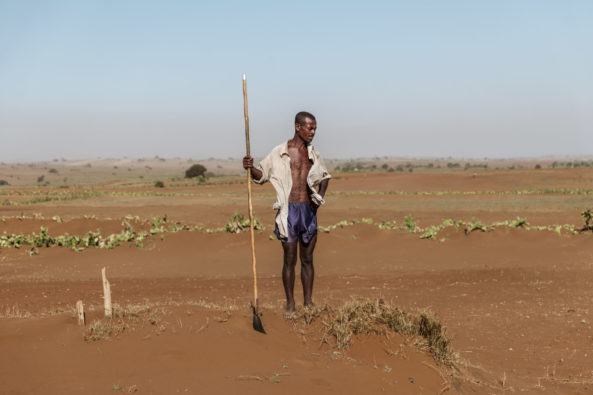
If humanity’s collective impact on land use and climate pushes too hard the resultant ‘ecological shock’ could irreversibly impoverish our biosphere. R&D to develop carbon free energy generation, cheap storage and efficient distribution – is a global imperative
A backdrop to all our attempts to forecast the future is that the world is getting more crowded. The number of births per year, worldwide, peaked a few years ago and is going down in most countries. Nonetheless population is still rising because of lengthening lifespans and continuing high birth rates in sub Saharan Africa. World population is therefore forecast to rise to around 9 billion by 2050.
Despite doom-laden forecasts 50 years ago food production has kept pace with rising population; famines still occur, but they’re due to conflict or maldistribution, not overall scarcity.
To feed 9 billion in 2050 will require further-improved agriculture – low-till, water-conserving, and GM crops – and maybe dietary innovations: converting insects—highly nutritious and rich in proteins—into palatable food; and eating artificial meat rather than real beef. To quote Mahatma Gandhi, there can be ‘enough for everyone’s need but not for everyone’s greed’.
Optimists say that each extra mouth brings two hands and a brain. But it’s the geopolitical stresses — the inequalities between countries as well as within countries — that are most worrying. As compared to the fatalism of earlier generations, those in poor countries now know what they’re missing. And migration is easier. It’s a portent for disaffection and instability. Wealthy nations, especially those in Europe, should urgently promote a ‘mega-Marshall Plan’ for Africa, and not just for altruistic reasons.
And another thing: if humanity’s collective impact on land use and climate pushes too hard the resultant ‘ecological shock’ could irreversibly impoverish our biosphere – we’re destroying the book of life before we’ve read it. Already, the biomass in humans, cows and domestic animals is 20 times that in wild mammals. And chickens and turkeys have more biomass than all the world’s wild birds. To avoid massive encroachment on natural habitats, ‘sustainably intensive’ agriculture must be a goal.
Biodiversity is crucial to human wellbeing. We’re clearly harmed if fish stocks dwindle to extinction; there are plants in the rain forest whose gene pool might be useful to us. And insects are crucial for the food chain and fertilization. But preserving the richness of our biosphere has value in its own right, over and above what it means to us humans. To quote the great Harvard ecologist E O Wilson ‘mass extinction is the sin that future generations will least forgive us for’.
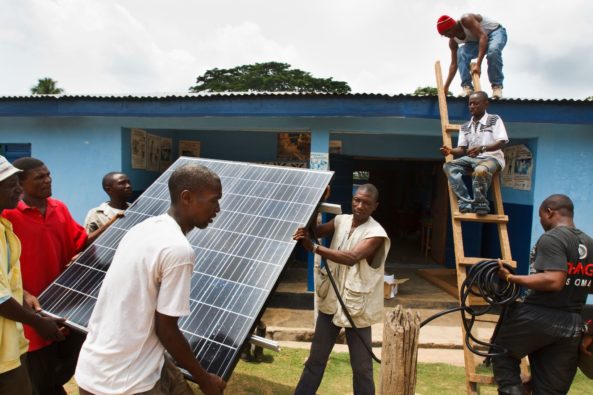
It is hard to conceive more inspiring goals for young scientists than to ensure sustainable food and energy supplies.
So the world’s getting more crowded. And there’s another firm prediction: it will get warmer. Climate change is certainly not under-discussed, though it is under-responded-to. Under a ‘business as usual’ scenario we can’t rule out, later in the century, really catastrophic warming, and tipping points triggering long-term trends like the melting of Greenland’s icecap. That’s why developing clean energy systems – carbon free generation, cheap storage and efficient distribution – is another global imperative.
Climate change is potentially a ‘global fever’, which somewhat resembles a slow-motion version of Covid 19. For instance, both crises aggravate the level of inequality within and between nations. People in the megacities of the developing world can’t isolate – and medical care is minimal. And likewise it’s those countries, and the poorest people in them, that will suffer most from global warming and the effects on food production and water supplies.
But — to insert a bit of good cheer — there’s a ‘win win’ roadmap to a low-carbon future. Technically advanced nations should accelerate R and D into all forms of low-carbon energy generation. And into other technologies where parallel progress is crucial – especially storage (batteries, compressed air, pumped storage, hydrogen, etc) and smart grids – perhaps eventually a global set of interconnectors. The faster these ‘clean’ technologies advance, the sooner will their prices fall they become affordable to low- and middle-income countries where more generating capacity will be needed, where the health of the poor is jeopardized by smoky stoves burning wood or dung, and where there would otherwise be pressure to build coal-fired power stations.
It is hard to conceive more inspiring goals for young scientists, technologists and engineers, in all parts of the world, than to ensure sustainable food and energy supplies globally in the coming decades. But we need to ensure that world leaders are working together to provide the best possible education, especially in STEM subjects and environmental sciences, to all the world’s children and young people.
The case for urgent action to cut CO2 emissions is compelling. But politicians tend to focus on the short term (before the next election) and on their own nation or constituency: they won’t prioritise measures that will benefit people in remote parts of the world decades ahead unless there’s public clamour from their voters. Scientists must enhance this clamour — by engaging with NGOs, via blogging and journalism, and enlisting charismatic individuals and the media to amplify their voice.
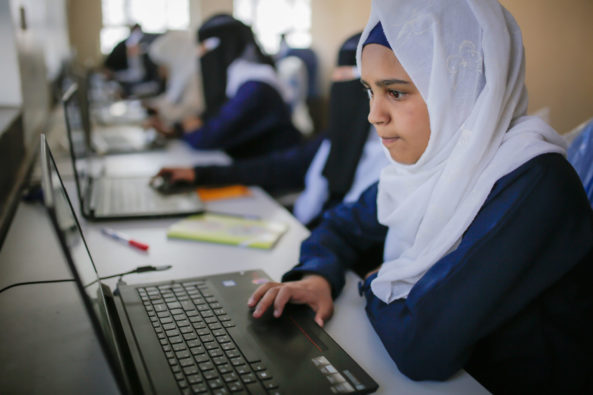
We can be certain that the world of work will change for the next generation. We will need to ensure that they are equipped with the skills they’ll need for this new world
We should be evangelists for new technology – without it the world can’t provide sustainable energy, nourishing food and good health for an expanding and more demanding population. But many of us are anxious that it’s advancing so fast that we may not properly cope with it – and that its misuse can give us a bumpy ride this century.
Advances in microbiology — diagnostics, vaccines and antibiotics — offer prospects of containing natural pandemics. But the same research raises (and it’s my number-one fear) the prospect of engineered pandemics. Regulation of biotech is needed. But I’d worry that whatever regulations are imposed, on prudential or ethical grounds, can’t be enforced worldwide – any more than the drug laws can — or the tax laws. Whatever can be done will be done by someone, somewhere. And that’s a nightmare.
These concerns are relatively near-term – within 10 or 15 years. What about 2050 and beyond? The smartphone, the web and their ancillaries – ubiquitous today — would have seemed magic even just 25 years ago. So, looking several decades ahead we must keep our minds open, or at least ajar, to transformative advances that may now seem science fiction.
On the bio front we might expect two things. A better understanding of the combination of genes that determine key human characteristics — and the ability to synthesise genomes that match these features. One day perhaps ‘designer babies’ – destined to be more intelligent or longer-lived than the present generation, may be conceivable (in both senses of that word!) – but it’s likely these innovations will be regulated on prudential or ethical grounds.
And what about another transformative technology: robotics and artificial intelligence (AI) There are exciting advances in machine learning.
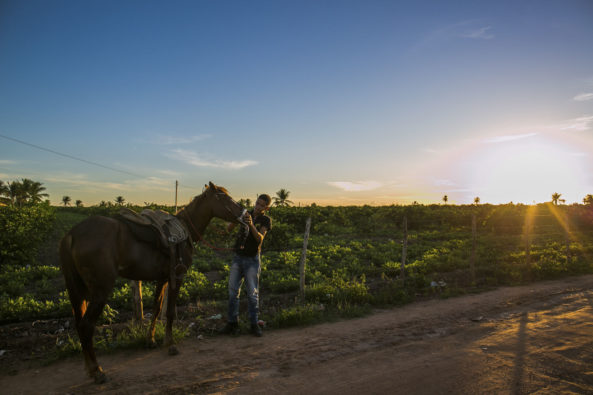
Coping with climate change is a doddle compared to terraforming Mars. There’s no ‘Planet B’. We must cherish our Earthly home.
The big social and economic question is this: will this ‘second machine age’ be like earlier disruptive technologies – the car, for instance – and create as many jobs as it destroys? Or is it really different this time? AI won’t just take over manual work (indeed plumbing and gardening will be among the hardest jobs to automate) but will do routine legal work (conveyancing and suchlike), medical diagnostics and even surgery. We can be certain that the world of work will change – is already changing – for the next generation. We will need to ensure that they are equipped with the skills they’ll need for this new world.
The money ‘earned’ by robots could generate huge wealth for an elite. But I think that a fair society will require massive redistribution of that income to ensure that everyone has at least a ‘living wage’. This shouldn’t be a handout but should be achieved by creating and upgrading public-service jobs where the human element is crucial, which are now undervalued and where demand is huge – especially carers for young and old.
But it’s in my own special field, space, that robots and AI have the greatest scope and raise fewest concerns. During this century, the entire solar system will be explored by flotillas of tiny robotic craft. But don’t ever expect mass emigration from Earth. It’s a dangerous delusion to think that space offers an escape from Earth’s problems. Coping with climate change is a doddle compared to terraforming Mars. There’s no ‘Planet B’. We must cherish our Earthly home.
Indeed, a cosmic perspective offers a vision of just how special our Earth is. If our generation are negligent stewards – ‘poor ancestors’ as it were — we shall not only jeopardize the welfare of our children and grandchildren but risk foreclosing vast future potentialities.
Opinion polls show, unsurprisingly, that younger people who expect to survive most of the century, are more engaged and anxious about long-term and global issues – and their activism gives ground for hope. So, what should be our message to them? It’s surely that there’s no scientific impediment to achieving a sustainable world, where all enjoy a lifestyle better than those in the ‘global north’ do today. We live under the shadow of new risks – but these can be minimized by a culture of ‘responsible innovation’, and by reprioritizing the thrust of the world’s technological effort.
So we can be technological optimists. But the intractable politics and sociology engenders pessimism. The scenarios I’ve described – environmental degradation, unchecked climate change, and unintended consequences of advanced technology — could trigger serious, even catastrophic, setbacks to our society. And of course, most of the challenges are global. The threats of potential shortages of food, water, and natural resources — and transitioning to low carbon energy — can’t be solved by each nation separately.
Scientists have an obligation to promote beneficial applications of their work and warn against the downsides.
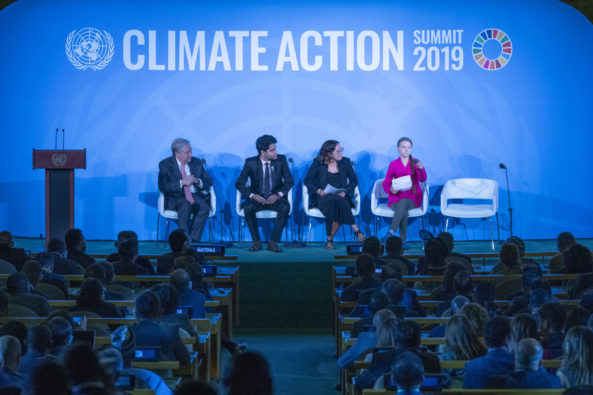
2021’s Summit meetings give the UK a unique opportunity. Global Britain can help mobilise the international community around a new vision that harnesses science, and the energy of the young, to build a safer, sustainable, just and equitable society that can look ahead with hope to a better future for children growing up in the 21st century
Politicians focus on immediate threats like Covid 19. But they won’t prioritise the global and long-term measures needed to deal with threats to climate and biodiversity unless the press and their inboxes keeps these high on their agenda.
I’ll end with a flashback – right to the middle ages. For medieval people, the entire cosmology—from creation to apocalypse—spanned only a few thousand years. They were bewildered and helpless in the face of floods and pestilences—and prone to irrational dread. Large parts of the Earth were terra incognita. But they built cathedrals – constructed with primitive technology by mason who knew they wouldn’t live to see them finished; vast and glorious buildings, that still inspire us centuries later.
Our horizons, in space and time, are now vastly extended, as are our resources and knowledge. But we don’t plan centuries ahead. This seems a paradox. But there is a reason. Medieval lives played out against a ‘backdrop’ that changed little from one generation to the next. They were confident that they’d have grandchildren who would appreciate the finished cathedral. But for us, unlike for them, the next century will be drastically different from the present. We can’t foresee it, so it’s harder to plan for it. There now a huge disjunction between the ever-shortening timescales of social and technical change and the billion-year timespans of biology, geology, and cosmology.
“Space-ship Earth” is hurtling through the void. Its passengers are anxious and fractious. Their life-support system is vulnerable to disruption and breakdowns. But there is too little planning — too little horizon-scanning. We need to think globally, to think rationally, to think long-term—empowered by twenty-first-century technology but guided by values that science alone can’t provide. And we need to do all that now. 2021’s series of Summit meetings give the UK a unique opportunity.
Global Britain can help mobilise the international community around a new vision that harnesses science, and the energy of the young, to build a safer, sustainable, just and equitable society that can look ahead with hope to a better future for the children growing up in the 21st century and beyond. The 20th century, for all its progress in living standards for some, was a century of unprecedented conflict, unbridled damage to our planet, and the tragedy of gross global inequities. We allowed billions to live in poverty, children to die unnecessarily of preventable diseases. The pandemic has been a wake-up call that reminds us forcefully that we are all interconnected, and that science can be harnessed to achieve global goals. If we have the determination and foresight, we can learn those lessons and make the 21st century very different and so much better. Let’s start now!
Please note that the views expressed in this essay are those of the author and do not necessarily represent the views of UNICEF UK.


